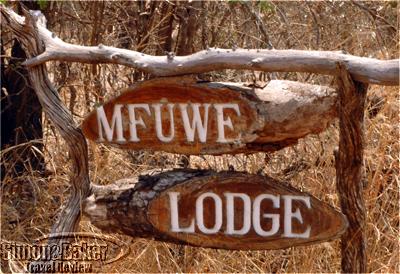
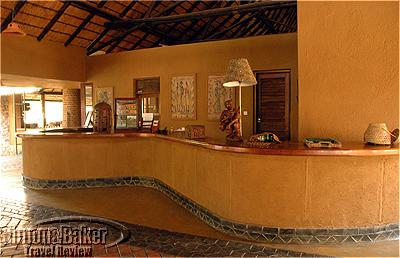
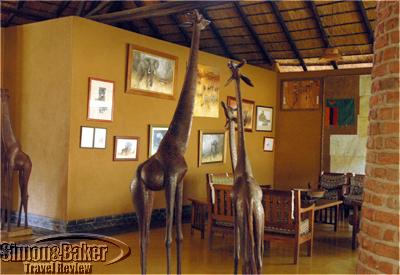
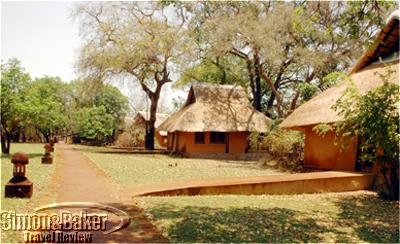
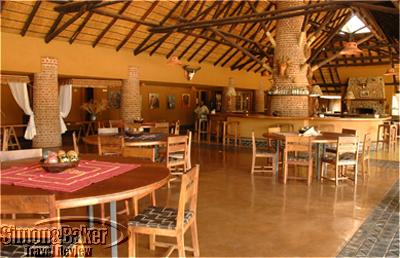
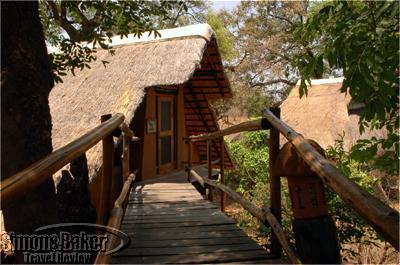
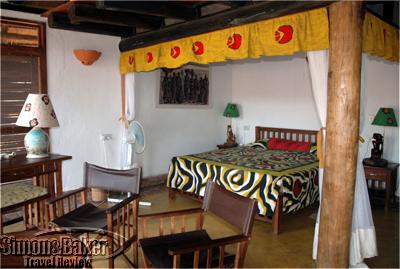
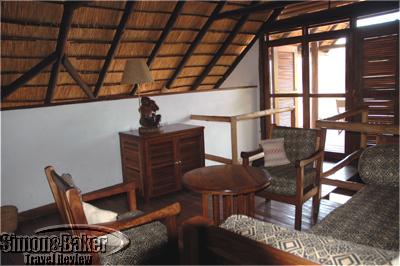
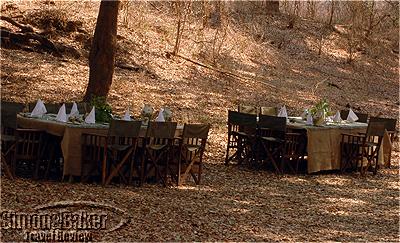
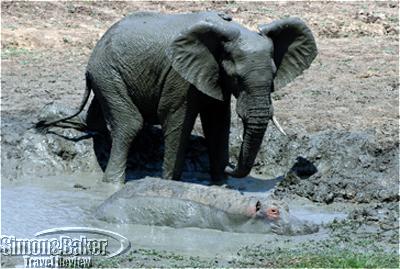
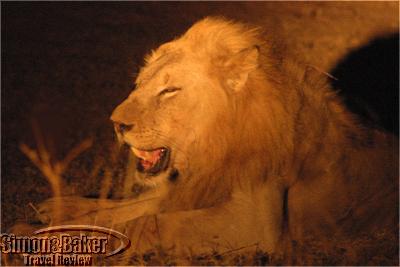
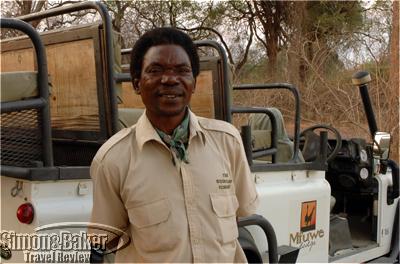

- Overall Impression
- Details
- Common Areas
- Accomodate
- Room
- Dining
- Features
- Wildlife
- Activities
- Other
- Review
On both sides of the main lodge, a paved walkway led to 18 guest chalets strung along the edge of the lagoon, all within an easy five-minute walk from the lodge. Like the common areas, the chalets were built of local stone, timber and thatch. In spite of its expansive size, the complex, which also included a library and a small conference center, each in their dedicated chalet, blended unobtrusively within the surrounding landscape. Since it was frequent for elephants, hippos, warthogs and the occasional predator to wander the grounds, a ranger escort was mandatory after dark to walk between the main lodge and the guest chalets. I stayed at the Mfuwe Lodge at the end my visit to the park. After experiencing for over a week the idyllic seclusion of the remote bush camps, I found the lodge the perfect environment to gently ease myself back into the “outside world.” Guests included families with children and others who wanted to effortlessly enjoy abundant and varied game viewing in luxurious comfort. The lodge was also a favorite residence for the occasional business traveler to the Mfuwe area.
Handicapped Access The lodge could accommodate handicapped guests on a case-by-case, pre-arranged basis.
Length Of Stay Three nights
Location The Mfuwe Lodge was located two miles from the main entrance to the South Luangwa National Park.
Managers Andrea Bizzaro and Andy Hogg
Owners The Bushcamp Company, owned and operated by Andrea Bizzaro and Andy Hogg
Size The Mfuwe Lodge could accommodate up to 40 guests in its 18 luxury guest chalets. The property covered approximately 25 acres. It had a staff of 60 permanent employees, as well as 40 temporary workers.
Transportation Mfuwe could be reached by air from Lusaka and Livingstone. Road transfers to and from the airport took approximately 45 minutes and were arranged by the Bushcamp Company, who owned and operated the lodge.
Year Open-Renovated Previously owned by the Zambian government, the Mfuwe Lodge was privatized in 1996. It was then fully renovated and re-opened in 1998. According to the camp staff, it has been the object of rigorous on-going maintenance and minor enhancements ever since.
The walls of the main lodge were covered in apricot-colored stucco. In the center of the common area, a circular bar about twelve feet in diameter surrounded a large pillar of local brick that was a main support of the sharply peaked roof. The bar provided a visual separation between the lounge and the dinning room. The lounge featured several groupings of sofas and armchairs upholstered in earth tone print materials, gathered around wooden coffee tables. The floor was a polished concrete slab, stained to a rich brown. A raised-hearth fireplace occupied the entire end wall. In spite of its imposing scale, the lounge was an inviting place to socialize or relax.
The bedroom was 20 foot by 20 foot (400 square feet) with a king-size bed tucked in an alcove that was entirely draped off with mosquito netting at night. The bed was flanked by two bedside tables with reading lamps. A large, silent oscillating floor fan was placed in the alcove at night to enhance the air circulation for a comfortable night’s sleep. There was small round table and two brown leather director’s chairs in the center of the room. A writing desk and stool were angled in front of a side window. A large storage credenza with a small refrigerator stocked with fresh drinking water, and a wooden chest that doubled as a luggage rack lined the internal wall separating the bedroom from the bathroom.
The interior walls were covered with bright white rough plaster. Paintings and prints of local scenes hung on the walls. Upstairs flooring was hardwood. Downstairs the flooring was saffron-colored concrete polished to a mat gloss. The furniture was made from polished honey-colored local wood. An eight foot long, floor-to-ceiling wardrobe occupied the back wall of the downstairs foyer.
The front of the bedroom was made of sliding screened doors that opened onto a six foot wide balcony overlooking the lagoon, which was reduced to a string of water holes when I visited at the end of the dry season. One of them, a favorite mud bathing spot for elephants and hippos, was a mere 50 feet away from my balcony.
However, the most memorable meal of my stay at the Mfuwe Lodge occurred at the end of my second morning game drive, when the three guides who were leading tours that morning drove their guests to a shady grove. Under soaring trees that joined high overhead to form cathedral-like arches, we found tables set formally. Over a five foot long wood charcoal grill, several members of the staff were putting the finishing touches to a full English breakfast complete with sausages, grilled tomatoes and fried eggs. This surprise al fresco brunch was apparently organized on a weekly basis. It was my good fortune to have it coincide with my visit.
The following night, we were treated to another exceptional meal. Candlelit dinner tables were set on the boma , the large timber and stone deck that reached over lagoon. Under the brightly starlit sky, we sampled many traditional braai dishes. Our braai , or southern African barbecue, included spicy, marinated beef, pork, chicken and sausages and krummpelpap (crumb porridge) served with the meat.
Facilities The property boasted a free-standing meeting facility capable of accommodating up to 40 people, and a reference library focused on African fauna, flora and conservation issues. The library was said to contain more than 300 books and videos in its dedicated chalet. Unfortunately, at the time of my visit it was temporarily closed for repairs. A small curio shop was located just off the lounge. It offered a limited array of local textiles, small wood carving and bead jewelry. It also carried a few basic travel necessities such as sunscreen and toothpaste.
Pool The pool was 40 foot long by 20 foot wide, with depths ranging from four to seven feet. The entire length of it overlooked the lagoon, offering an unimpeded view of the constant game activity below. On the other three sides, the pool was surrounded by a wooden deck that held a dozen lounge chairs with natural canvas pads, shaded by beach umbrellas. Beach towels were available on demand.
On my second evening drive, when I was the only guest in the vehicle, James treated me to an unforgettable experience. He drove at sunset to a spectacular vantage point overlooking a bend in the Luangwa River. The heavy silence of the bush was filled with sounds of powerful steps and cracking branches, hinting at elephants gathering in the underbrush nearby. After what seemed a very long time, we saw a large bull elephant cautiously start walking down the steep bank of the river. Soon another elephant followed. In the fading light, I stood mesmerized as seventy-six elephants slowly filed across the river and up the other bank, before disappearing into the trees.
Game activity was as bountiful on the lagoon facing the lodge as it was in the surrounding bush, so that game-watching was a main activity of every waking moment. One of my favorite viewing spots was the pool area, where I could swim and sunbath away the early afternoon siesta while observing a herd of zebra stroll by, or an elephant cow initiate her newborn calf to the pleasures of mud bathing.
The lodge had cellular phone coverage with a GSM 900/1800 compatible international cell phone.
Date Of Last Visit October 2006
ReviewersArticle and photographs by Josette King
Service The staff was unobtrusively attentive, friendly, and overall excellent. The room was serviced twice a day. Any laundry left in the hamper in the morning was returned freshly laundered and ironed by the next morning at the latest.
Would You Stay Again? Yes
Contact Information
- The Bushcamp Company
- PO Box 91
- Mfuwe, Zambia
- + (260) 624 5041
- + (260) 624 6041
- (871) (76) 228 01231
